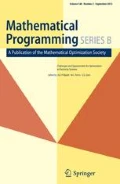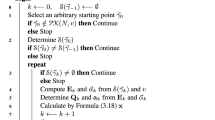Abstract
An economic production game is treated, in which players pool resources to produce finished goods which can be sold at a given market price. The production process is linear, so that the characteristic function can be obtained by solving linear programs.
Duality theory of linear programming is used to obtain equilibrium price vectors and to prove the non-emptiness of the core. Under replication, it is shown that, in the non-degenerate case, the core converges finitely to the set of competitive equilibria; a counter-example shows that this is not true in the degenerate case (i.e., only convergence in the limit can be guaranteed).
Similar content being viewed by others
Bibliography
G. Debreu and H. Scarf, “A limit theorem on the core of an economy”,International Economical Reviews 4 (1963) 235–246.
L.S. Shapley and M. Shubik, “The assignment game 1: the core”,International Journal of Game Theory 1 (1972) 111–130.
L.S. Shapley, “On balanced sets and cores”,Naval Research Logistics Quarterly 14 (1967) 453–460.
Author information
Authors and Affiliations
Additional information
This research was supported by the Army Research Office under Grant No. DA-ARO-D-31-72-G105.
Rights and permissions
About this article
Cite this article
Owen, G. On the core of linear production games. Mathematical Programming 9, 358–370 (1975). https://doi.org/10.1007/BF01681356
Received:
Revised:
Issue Date:
DOI: https://doi.org/10.1007/BF01681356




